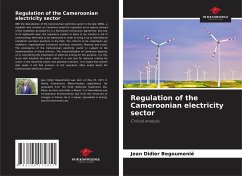With the liberalization of the Cameroonian electricity sector in the late 1990s, a regulator was created, as Cameroon opted for regulation by an agency instead of the modalities provided for in a Framework Concession Agreement. But now in its eighteenth year, the regulatory system in place in our country is full of shortcomings that need to be addressed in order to bring it up to international standards and best practices in the field. The reforms to be undertaken are multiform: organizational, functional, technical, economic, financial and social. The emergence of the Cameroonian electricity sector is subject to the implementation of these reforms. The industrialization of Cameroon depends on it, considering the importance of electrical energy for this purpose. It is this issue that inspired this book, which is a real tool for decision making for actors in the electricity sector and potential investors. It is hoped that anyone who reads it will find answers to the questions often asked about the Cameroonian electricity sector!
Hinweis: Dieser Artikel kann nur an eine deutsche Lieferadresse ausgeliefert werden.
Hinweis: Dieser Artikel kann nur an eine deutsche Lieferadresse ausgeliefert werden.








